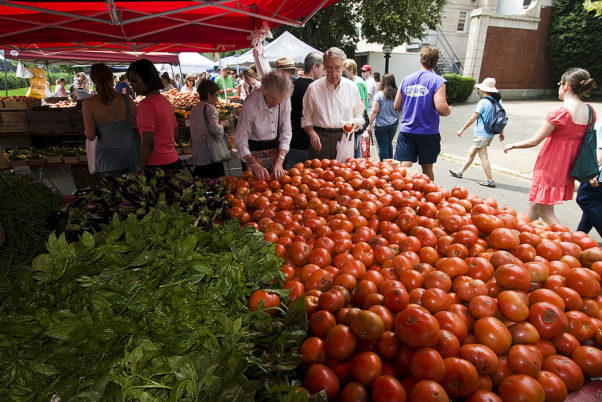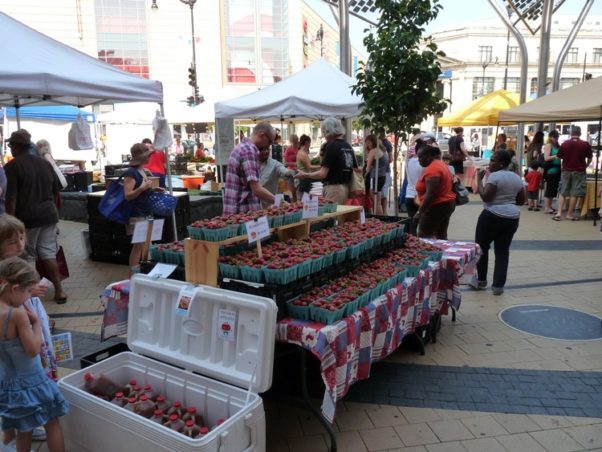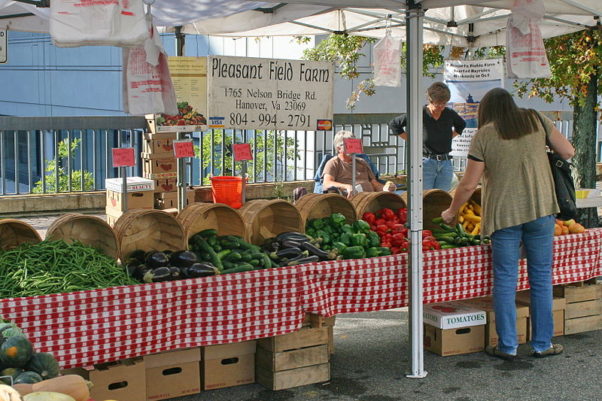Food Safety Tips for Farmers Markets
The month of May means it is nearly time for America’s favorite food lovers’ tradition: visiting your local farmers market. In addition to all the invigorating colors, exquisite aromas, strong flavors and spirit of community, the farmers market is also an opportunity to develop one-on-one relationships with the people who produce your food! Their passion for food can be quite inspiring.

The Freshfarm’s Dupont Circle Farmers Market is open Sundays from 8:30 a.m.-1:30 p.m. year round at 1500 20th St. NW.
(Photo: Point Images/Flickr)
But no matter where you get your food – by supporting local farmers or by shopping your neighborhood supermarket – food safety is always important.
Food that is fresh is a delicious treat! Organic and sustainable farming doesn’t use pesticides, chemicals, hormones and other additives, but it isn’t necessarily safer when it comes to foodborne illness – because everything is still grown in the dirt and handled by humans. Pathogens such as E. coli, Listeria and Salmonella are found naturally in soil, as well as manure. Which basically means, everything needs to be washed.
Farmers and vendors selling food at the farmers market, as well as consumers/shoppers should understand the necessary steps to reducing the risk of illness from food. “It’s a good idea to know the signs of safe food handling when you visit each market vendor,” said Deirdre Schlunegger, CEO of Stop Foodborne Illness, a national public health organization whose mission is preventing illness and death from foodborne pathogens. “Knowing your favorite farmers and vendors are using safe food practices, definitely boosts one’s confidence in their purchases!”
Most states have passed legislation regulating farmers’ markets. For example, in Illinois, most home-canned foods other than jams, jellies and preserves cannot be sold at the farmers market. Typically, farmers markets must be inspected by local health departments who make sure each market meets food safety standards, and most vendors, including those from so-called “cottage industries,” must be licensed to sell their products at farmers markets.
For a list of farmers markets in your area click here.
If you’re interested in policies and regulations affecting farmers markets in your state, contact the department of health.

Community Foodworks’ Columbia Heights Farmers Market is open Saturday from 9 a.m.-1 p.m. from April through December and Wednesday from 4-7 p.m. from May-October on the civic plaza at 14th Street and Park Road NW. (Photo: Community Foodworks)
What to look for when it comes to safe food handling
The condition of the vendors’ booths and their products can tell you a lot about their safe food practices. Here are some things to look for:
- Clean hands. Dirty fingernails or a filthy apron aren’t appetizing. For vendors serving food – are they wearing gloves, and is their hair covered?
- A certification notice. Some vendors will display certificates that show they have been trained in food safety. These are good indicators that their foods are handled properly.
- The carton is clean. When buying eggs, look to see if the carton is clean – inside and out, and make sure the eggs are clean and not cracked. Reused egg cartons are fine, if clean.
- Cold foods are cold. Meats, cheeses and other dairy, and eggs should be kept cold. Salads and cold sandwiches should feel like they are straight from the fridge.
- Meat, poultry and fish are cooked to a safe temperature. The only way to determine a safe temperature for meat, poultry or fish, is by using a cooking thermometer. If you aren’t sure, ask.
- Hot foods are hot. The “Danger Zone” for food (where bacteria multiply quickly) is between 40-140 degrees Fahrenheit. Cooked foods like soups and burgers should be piping hot.
- Samples are being safely handled. Vendors using gloves, tongs, tissues or other utensils are doing it right! (They shouldn’t be using bare hands.) Are knives, serving utensils, dishes and service surfaces kept clean? If not, take a pass on these foods.
- Ciders, juices and dairy products are pasteurized. Since unpasteurized foods are serious sources of foodborne pathogens, shoppers should ask when products, including the samples, are not clearly labeled.

Community Foodworks Arlington Farmers Market is open from 8 a.m.-noon Saturdays year round at 1401 N. Courthouse Road, Arlington, year round. (Photo: cliff1066/Wikimedia Commons)
On hot days …
- Be mindful of jars open for sampling — sauces, salsas, jams, pickles and so on — they should not be out for more than two hours at outside temperature. One hour, if it’s over 90 degrees Fahrenheit. Many markets have started offering hand-washing stations with hand sanitizer. We encourage you to use them.
- If you are purchasing perishables like dairy, eggs or meat bring a cooler or insulated bag with ice to the market, so your newly purchased products can be kept cold for the ride home in the hot car.
- Make the farmers market your final stop before heading home. Your fresh veggies and fruit, and other perishable foods, won’t have to sit long in a hot car, and will make it to the refrigerator that much more quickly.
Foodborne illness is no laughing matter; serious cases can have severe and long-lasting consequences. Keep in mind that babies, young children, pregnant women, older adults and people with compromised immune systems are most vulnerable to serious attacks of foodborne illness.
Article by Stop Foodborne Illness, a national public health organization whose mission is preventing illness and death from foodborne pathogens.

This article was written by the guest author listed at the end of the article.



